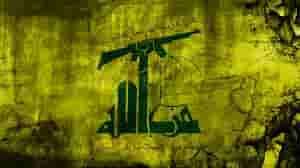What you are looking at is the latest declassified map of what the IDF says are the active military installations built by Hezbollah. Note that they are all along the frontier with Israel, and that they have been deliberately placed within civilian towns and villages, even within civilian homes, places of worship, and schools. This is part of the terrorist organization's asymmetric warfare policy.
Many of these contain offensive weapons, including rockets and missiles, which are targeting civilian population centers. The Government of Israel has stated, time and time again, that the next war between it and Hezbollah, will not only result in the utter destruction of these Lebanese border towns, including areas where safe haven for weapons, inside and underneath homes, schools and mosques, has occurred, but Lebanese infrastructure, countrywide, will also be attacked and disabled.
This means that the downtown financial center of Beirut, where most of the country's powerful banks have their headquarters, becomes a definite military target. should Hezbollah initiate cross-border armed conflict. Although financial records today, thanks to technology, will generally survive the loss of downtown Beirut's banks & bank buildings, it will take months, or perhaps years, for the country's financial center to recover and rebuild, and many clients will be lost along the way.
Given that Hezbollah has been emboldened in recent years, due perhaps to the development of its conventional army, now fighting in Syria, it is reasonable to expect that there will be a Third Lebanon war, in the short term. It is assumed that compliance officers at banks whose customers are engaged in trade and business with Lebanese companies are already reducing their risk of loss, should the Beirut banking center be severely damaged, or even destroyed, but this new intelligence should make risk reduction, when it comes to Lebanon, a high priority.
So long as Hezbollah trains Iranian missiles on Israel, expect an extraordinary level of IAF payback, including in Downtown Beirut, if and when they are launched at civilians inside Israel; Country Risk for Lebanon has just become extraordinarily high.
Contributed by Kenneth Rijock
Chronicles of Monte Friesner










